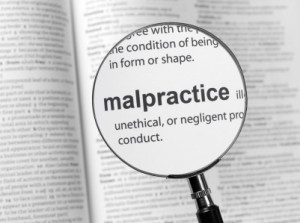 There are many different types of malpractice. In the legal sense of the word, malpractice refers to negligent or incompetent behavior on the part of a professional. The particulars of malpractice vary greatly depending the particular situation and profession involved. If an individual believes that they or a loved one have been the victim of an instance of malpractice, it may be prudent to hire a malpractice lawyer and file a lawsuit.
There are many different types of malpractice. In the legal sense of the word, malpractice refers to negligent or incompetent behavior on the part of a professional. The particulars of malpractice vary greatly depending the particular situation and profession involved. If an individual believes that they or a loved one have been the victim of an instance of malpractice, it may be prudent to hire a malpractice lawyer and file a lawsuit.
Types of Malpractice
The precise nature of professional incompetence and negligence can vary from profession to profession. Malpractice claims are most commonly filed against individuals operating in the legal or medical fields. However, other white-collar professions may also be guilty of malpractice and resultantly have a lawsuit filed against them.
Common types of malpractice include:
Medical Malpractice: Due to the life-and-death nature of medicine, malpractice suits are often filed against medical professionals. Within the scope of medical malpractice claims, there are four different areas where lawsuits are likely to be filed. These areas are:
- Cosmetic Surgery: Cosmetic surgery has become a very popular procedure over the last ten years, with over 11 million procedures being performed in 2006 alone. When these procedures do not go as planned, it is sometimes as the result of improper technique on the part of plastic surgeons.
- Prescription Drugs: Errors in prescribing drugs can result in life-threatening consequences to patients. As a result, prescription drug malpractice cases are common and may result in compensation. In addition to mistakenly prescribing the wrong drug, drug-related malpractice claims may involve administering the wrong dosage of a medication, or failing to be aware of dangerous interactions between prescribed drugs. Additionally, claims may be filed against pharmaceutical companies who have manufactured a faulty product or failed to warn consumers of all of its dangers.
- Birth Injuries: The process of delivering a baby may be fraught with danger if performed incorrectly. Medical professionals may be guilty of birth injury malpractice if the tools used to deliver a baby are operated incorrectly. Additionally, malpractice may be present if medical professionals prescribe medications which harm the health of baby and mother, or if they fail to prepare in advance for the possibility of a birth by C-section.
- Diagnosis or Surgical Errors: If a doctor significantly misdiagnoses an illness or disorder, they may be held liable for the harm this misdiagnosis causes a patient. If a surgeon causes additional injury to a patient while performing a operation, they also may be held liable for their error and sued for malpractice.
Legal Malpractice: In legal malpractice claims, an individual asserts that a legal professional does not complete their duties with the level of expertise expected from the profession. This usually involves a failure to represent a client properly in court. If a legal professional fails to properly present the facts of a case, overbills their client or has conflicts of interest relating to the case, they may be guilty of malpractice.
Professional or White Collar Malpractice: Members of the financial and accounting fields may also be held liable for malpractice. Malpractice in finance may take the form of misleading statements made by stock brokers, or instances of insider trading. Accounting errors may result in a malpractice claim as well. If an accountant fails to properly bill an individual or purposely overbills them, they may be held liable.
Malpractice Attorneys
In the event that an individual believes they have grounds for a malpractice claim, it may be wise to contact a malpractice attorney. Malpractice attorneys are familiar with the legal proceedings involved with malpractice claims. They are also able to help determine whether or not an individual has significant cause to file a malpractice claim.
